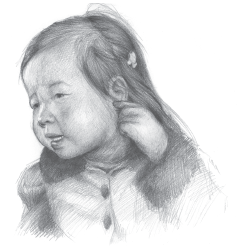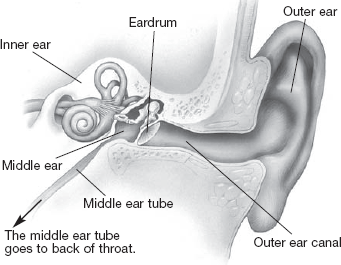Medical Conditions
Ear Infections
Print, Share, or View Spanish version of this article
 Ear infections (in-FEK-shuns) in children are common. Most kids get at least one ear infection by the time they are 3 years old. Most ear infections clear up without any lasting problems. Your child’s doctor may also call an ear infection otitis (oh-TYE-tis) media.
Ear infections (in-FEK-shuns) in children are common. Most kids get at least one ear infection by the time they are 3 years old. Most ear infections clear up without any lasting problems. Your child’s doctor may also call an ear infection otitis (oh-TYE-tis) media.
Ear infections usually hurt. Older kids can tell you that their ears hurt. Little children may only cry and act fussy. You may notice this more when your child eats. That’s because sucking and swallowing can make the pain worse. Children with an ear infection may not want to eat. They may have trouble sleeping. Ear infections also can cause fever.
What to Do for Ear Pain
Give your child acetaminophen
-
Be sure to get your child the right kind for your child’s age. Follow what the label says. Ask your child’s doctor how much to give if your child is younger than 2 years.
-
The pain may last up to 3 days. So it’s fine to give medicine at the right dose during the day and at night for 3 days. Follow the label to see how often you can give it.
-
There are also ear drops that can help with pain. Ask the doctor before you try them.
Call the Doctor If…
…your child has ear pain and any of these signs:
-
Your child is younger than 2 years.
-
Yellowish-white or bloody fluid is coming out of your child’s ear.
-
Your child is in a lot of pain.
-
Your child is acting sick or can’t sleep.
-
Your child has trouble hearing. This could be from an ear infection. But it might be something else. It’s important to get help if your child has a hearing problem.
-
Your child has one ear infection after another for many months. It may be time to try a new treatment.
If your child is older than 2 years, you can wait 1 or 2 days to call the doctor if…
-
Your child does
not have a high fever (over 103°F or 39.4°C) AND -
Your child does not act sick.
What About Antibiotics?
The doctor may prescribe medicine for your child. This medicine will probably be an antibiotic (ant-uh-by-AH-tik). Antibiotics kill the germs that cause some infections.
Some ear infections will get better on their own. It’s best for your child not to take an antibiotic unless it is needed. So the doctor may ask you to wait 1 or 2 days to see if your child gets better without medicine.
So when is an antibiotic needed? The doctor may prescribe an antibiotic if your child:
-
Is very sick.
-
Is younger than 2 years.
-
Does not feel better 2 days after the ear pain began.
Make sure your child takes

If your child is taking antibiotics and isn’t starting to get better after 2 days, call the doctor.
What Not to Do
-
Don’t give your child aspirin. It’s dangerous for children younger than 18 years.
-
Don’t give your child over-the-counter cold medicines. They
don’t help clear up ear infections. -
Don’t let your child swim or travel by plane right after an ear infection. Check with the doctor first.
What to Expect
With
-
After 1 to 2 days, pain and fever should start getting better.
-
After 3 days, pain and fever should go away.
-
Call the doctor if your child doesn’t start feeling better in 2 days.
Your child might feel a “popping” in the ears as the infection starts to clear up. This is a sign of healing.
Children with ear infections don’t need to stay home if they feel OK. Just make sure your child keeps taking any medicine he or she needs.
How Your Child Can Get an Ear Infection
The ear has 3 parts—the outer ear, middle ear, and inner ear. A small tube, called the middle ear tube, connects the middle ear to the back of the throat. It’s called the eustachian tube (yoo-STAY-shin toob). This tube can get blocked when a child is sick. Then fluid builds up in the middle ear. If germs get into the fluid, it can cause an infection. The inside of the ear may swell up and hurt.
How to Prevent Ear Infections
Here are some ways to lower your child’s risk of an ear infection:
-
Breastfeed instead of bottle-feed. Breastfeeding may help prevent colds and ear infections.
-
If you bottle-feed, hold your child’s head higher than the stomach during feedings. This helps keep the ear tubes from being blocked.
-
Keep your child away from tobacco smoke, especially in your home and car.
-
Some vaccines may help your child get fewer ear infections. These include vaccines to prevent flu and pneumonia (nuh-MOH-nyuh).
Other Causes of Ear Pain
Here are some other things that can make your child’s ears hurt:
-
An infection of the outer ear canal, often called “swimmer’s ear” (Ask your child’s doctor about home treatment for swimmer’s ear.)
-
Blocked or plugged middle ear tubes from colds or allergies
-
A sore throat
-
Teething or sore gums



